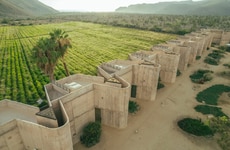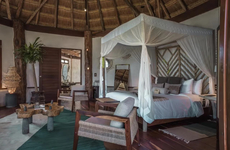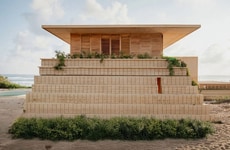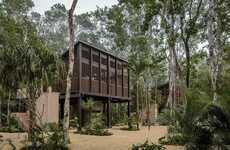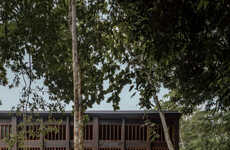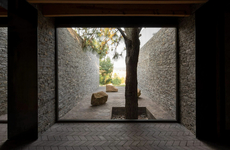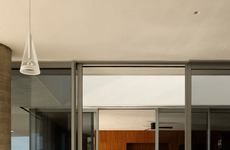
Estudio ALA Embraces the Todos Santos Vernacular in a New Hotel Design
Francesca Mercurio — August 13, 2021 — Eco
References: estudioala & archdaily
Estudio ALA has completed a unique hotel design for El Perdido, a boutique hotel that sits 800 meters from the Pacific Ocean in Todos Santos, Mexico.
The hotel is situated in the quaint agricultural town of El Pescadero. This region features low shrubland that flows into the foothills of the Sierra de Laguna mountains. After extensive climatic analysis, the designers constructed a hotel that responded to the geographical conditions of El Pescadero. Given the unique climate conditions, the hotel features optimal heating and cooling systems to provide its guests with a comfortable climate.
The architects equally responded to the local vernacular to inform the hotel's aesthetic - earthen walls, wooden structures, and rich vegetation make up the design. The materials were regionally sourced and local craftsmen built the structure in an effort to embrace sustainable design practices.
Image Credit: Iwan Baan
The hotel is situated in the quaint agricultural town of El Pescadero. This region features low shrubland that flows into the foothills of the Sierra de Laguna mountains. After extensive climatic analysis, the designers constructed a hotel that responded to the geographical conditions of El Pescadero. Given the unique climate conditions, the hotel features optimal heating and cooling systems to provide its guests with a comfortable climate.
The architects equally responded to the local vernacular to inform the hotel's aesthetic - earthen walls, wooden structures, and rich vegetation make up the design. The materials were regionally sourced and local craftsmen built the structure in an effort to embrace sustainable design practices.
Image Credit: Iwan Baan
Trend Themes
1. Sustainable Hospitality - The use of locally sourced materials, sustainable design practices, and optimized heating and cooling systems is becoming a trend in the hospitality industry.
2. Climate-responsive Architecture - Architects are responding to the geographic conditions of a region to inform the design of buildings in a trend called climate-responsive architecture.
3. Local Sourcing - There is a trend towards locally sourcing materials, such as using local craftsmen and regionally sourced materials, in architecture and design projects.
Industry Implications
1. Hospitality - The hospitality industry can adopt sustainable design practices, develop optimized heating and cooling systems and, use locally sourced materials for their establishments.
2. Architecture - Architects can adopt climate-responsive designing to respond to the building environment and use locally sourced materials to create unique designs.
3. Sustainability - Companies can focus on sustainability by using materials that are regionally sourced and building structures that adhere to sustainable design practices.
6.2
Score
Popularity
Activity
Freshness

